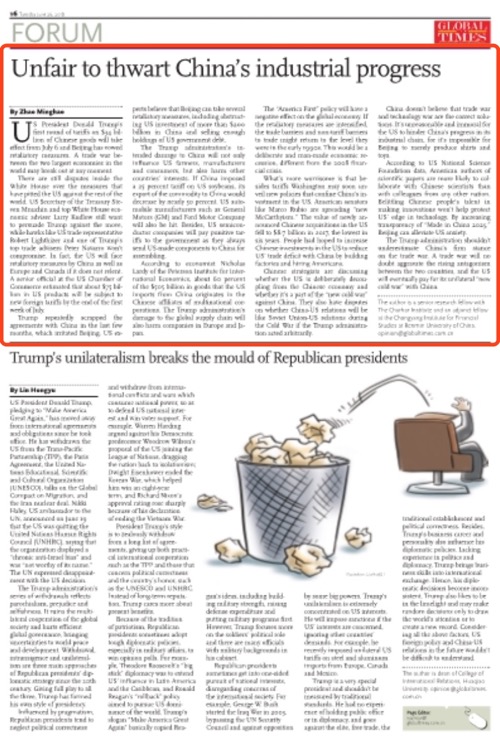Major Power Relations
Your Present Location: PROGRAMS> Major Power RelationsZhao Minghao: Unfair for US to thwart China’s industrial progress
By Zhao Minghao Source: Global Times Published: 2018-6-25
US President Donald Trump`s first round of tariffs on $34 billion of Chinese goods will take effect from July 6 and Beijing has vowed retaliatory measures. A trade war between the two largest economies in the world may break out at any moment.

There are still disputes inside the White House over the measures that have pitted the US against the rest of the world. US Secretary of the Treasury Steven Mnuchin and top White House economic adviser Larry Kudlow still want to persuade Trump against the move, while hawks like US trade representative Robert Lighthizer and one of Trump`s top trade advisers Peter Navarro won`t compromise. In fact, the US will face retaliatory measures by China as well as Europe and Canada if it does not relent. A senior official at the US Chamber of Commerce estimated that about $75 billion in US products will be subject to new foreign tariffs by the end of the first week of July.
Trump repeatedly scrapped the agreements with China in the last few months, which irritated Beijing. US experts believe that Beijing can take several retaliatory measures, including obstructing US investment of more than $200 billion in China and selling enough holdings of US government debt.
The Trump administration`s intended damage to China will not only influence US farmers, manufacturers and consumers, but also harm other countries` interests. If China imposed a 25 percent tariff on US soybeans, its export of the commodity to China would decrease by nearly 50 percent. US automobile manufacturers such as General Motors (GM) and Ford Motor Company will also be hit. Besides, US semiconductor companies will pay punitive tariffs to the government as they always send US-made components to China for assembling.
According to economist Nicholas Lardy of the Peterson Institute for International Economics, about 60 percent of the $505 billion in goods that the US imports from China originates in the Chinese affiliates of multinational corporations. The Trump administration`s damage to the global supply chain will also harm companies in Europe and Japan.
The "America First" policy will have a negative effect on the global economy. If the retaliatory measures are intensified, the trade barriers and non-tariff barriers to trade might return to the level they were in the early 1990s. This would be a deliberate and man-made economic recession, different from the 2008 financial crisis.
What`s more worrisome is that besides tariffs Washington may soon unveil new policies that confine China`s investment in the US. American senators like Marco Rubio are spreading "new McCarthyism." The value of newly announced Chinese acquisitions in the US fell to $8.7 billion in 2017, the lowest in six years. People had hoped to increase Chinese investments in the US to reduce US` trade deficit with China by building factories and hiring Americans.
Chinese strategists are discussing whether the US is deliberately decoupling from the Chinese economy and whether it`s a part of the "new cold war" against China. They also have disputes on whether China-US relations will be like Soviet Union-US relations during the Cold War if the Trump administration acted arbitrarily.
China doesn`t believe that trade war and technology war are the correct solutions. It`s unreasonable and immoral for the US to hinder China`s progress in its industrial chain, for it`s impossible for Beijing to merely produce shirts and toys.
According to US National Science Foundation data, American authors of scientific papers are more likely to collaborate with Chinese scientists than with colleagues from any other nation. Belittling Chinese people`s talent in making innovations won`t help protect US` edge in technology. By increasing transparency of "Made in China 2025," Beijing can alleviate US anxiety.
The Trump administration shouldn`t underestimate China`s firm stance on the trade war. A trade war will no doubt aggravate the rising antagonism between the two countries, and the US will eventually pay for its unilateral "new cold war" with China.
Zhao Minghao is a visiting fellow at the Chongyang Institute for Financial Studies at Renmin University of China.
Key Words: China; US; trade; Zhao Minghao























































































 京公网安备 11010802037854号
京公网安备 11010802037854号





